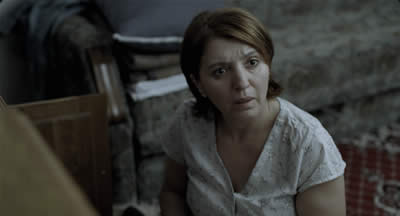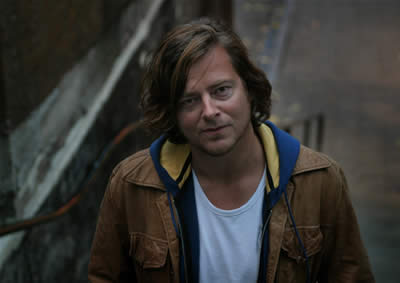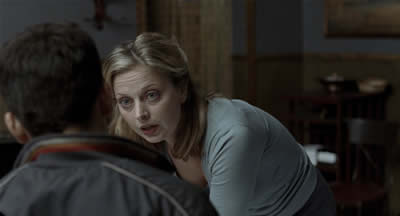 MIRUSH, a new film from Norway, is the third feature by director Marius Holst. After studying at the London International Film School, he made the prize-winning CROSS MY HEART and HOPE TO DIE. Then he started a production company with three colleagues and made DRAGONFLIES. He has also established himself as one of Norway’s foremost directors of commercials. On October 21st MIRUSH was awarded the top prize of the 56th International Film Festival Mannheim-Heidelberg in Germany and it has been showing at numerous other festivals.
MIRUSH, a new film from Norway, is the third feature by director Marius Holst. After studying at the London International Film School, he made the prize-winning CROSS MY HEART and HOPE TO DIE. Then he started a production company with three colleagues and made DRAGONFLIES. He has also established himself as one of Norway’s foremost directors of commercials. On October 21st MIRUSH was awarded the top prize of the 56th International Film Festival Mannheim-Heidelberg in Germany and it has been showing at numerous other festivals.
“Hold me,” Mirush mutters out of the side of his mouth to his big brother, but it’s not exactly a plea for affection. It means “hold me back” — while Mirush (Nazif Muarremi) feigns ferociousness against bigger boys in Kosovo who would taunt and tackle him. Years before this opening scene, Bekim (Enrico Lo Verso), a man of steely reserve, has made his way from the Balkans to Norway where he manages a restaurant and is starting a new life. But there are strings attached, and director Marius Holst unravels them with the classical dimensions of epic storytelling.
A spirited and agile boy, Mirush is fifteen years old, but he looks like ten and often acts like twenty. When he finds his mother in a lover’s embrace and his older brother is suddenly killed, he longs for the love of a father he hardly had a chance to know but idolizes. The boy’s iron will takes him far to the north, where he finds the man who left him long ago and failed to return. Incognito, Mirush works his way into his father’s life, admiring him, believing in him, and emulating him, but not knowing well enough the grown-up pressures of emigration that Bekim faces. It’s uncanny how Bekim, in turn, is drawn to his pint-size mirror image in the personality of Mirush, teaching him how to serve a beer and wait on tables; but Bekim is unable to respond to the super-ego role the boy grafts onto him. There is a third corner to this triangle — the Albanian Mafia, who stand to seal this tragedy-in-the-making. “I don’t have a family,” Bekim tells Mirush, and it is this second rejection that breaks the boy’s heart. It is therefore equally painful to see Mirush, in turn, betray not once, but twice, the only friend he has, a Norwegian waiter in his father’s restaurant.
brother is suddenly killed, he longs for the love of a father he hardly had a chance to know but idolizes. The boy’s iron will takes him far to the north, where he finds the man who left him long ago and failed to return. Incognito, Mirush works his way into his father’s life, admiring him, believing in him, and emulating him, but not knowing well enough the grown-up pressures of emigration that Bekim faces. It’s uncanny how Bekim, in turn, is drawn to his pint-size mirror image in the personality of Mirush, teaching him how to serve a beer and wait on tables; but Bekim is unable to respond to the super-ego role the boy grafts onto him. There is a third corner to this triangle — the Albanian Mafia, who stand to seal this tragedy-in-the-making. “I don’t have a family,” Bekim tells Mirush, and it is this second rejection that breaks the boy’s heart. It is therefore equally painful to see Mirush, in turn, betray not once, but twice, the only friend he has, a Norwegian waiter in his father’s restaurant.
 It can be quite amazing to watch Mirush, a youth well aware of his own fury, calibrate it for theatrical effect to intimidate rivals, his own school-age peers and the Albanian Mafia, no less. A fresh take on basketball in the life of teen boys shows us how Mirush parlays his hoop skills and a stolen Rolex into ready cash for what he deems as a worthy cause. Hell-bent on scoring his father’s approval, he’s an emotional torpedo. Then, to see this seemingly fearless boy melt with a drowsy smile as his father carries him to bed, or burst into song in his native tongue with an utterly unconsciousness verve, is to take him as a whole — a disarmingly compelling character whose every move betrays his longing and whose brain ticks away like a time bomb. Sadly for Mirush, his capacity for crafting his needs into strategies exceeds his wisdom of the world, and his father achingly observes this as he watches the boy’s passion drive him to further despair. And sadly for Bekim, he can take for granted the intuitive complicity of his son, but not recognize it as the very blood-bond that destroys them both.
It can be quite amazing to watch Mirush, a youth well aware of his own fury, calibrate it for theatrical effect to intimidate rivals, his own school-age peers and the Albanian Mafia, no less. A fresh take on basketball in the life of teen boys shows us how Mirush parlays his hoop skills and a stolen Rolex into ready cash for what he deems as a worthy cause. Hell-bent on scoring his father’s approval, he’s an emotional torpedo. Then, to see this seemingly fearless boy melt with a drowsy smile as his father carries him to bed, or burst into song in his native tongue with an utterly unconsciousness verve, is to take him as a whole — a disarmingly compelling character whose every move betrays his longing and whose brain ticks away like a time bomb. Sadly for Mirush, his capacity for crafting his needs into strategies exceeds his wisdom of the world, and his father achingly observes this as he watches the boy’s passion drive him to further despair. And sadly for Bekim, he can take for granted the intuitive complicity of his son, but not recognize it as the very blood-bond that destroys them both.
Mirush, tightly wrapped, unspools with the pace and drive of Sophocles on an I.C.E. rail pass. The film’s organic unity is pat: you do as you will, and you’ll answer for it. The film also takes on, always embedded in its characters, the acceptance/rejection paradigm in any emigration story, agitated by forces beyond family and nationhood. Nazif Muarremi plays Mirush as a boy as charismatic as he is flawed; we are utterly caught up in the magnetism of his kiss-of-death tailspin through life. Enrico Lo Verso, one of Italy’s top actors, plays the flip side of his unforgettable role in the award-winning Stolen Children with all the mystery and nuance that originally brought him fame.
At times Mirush brings us the intensity and panache of Scorsese, or the operatic depths of family betrayal we’ve seen in Coppola. Holst works aptly in the tradition of big-screen cinema that captures myth, history, and tragedy with both gritty realism and poetic imagery. His cinemascope frame brings us an Oslo we have never seen before, faithful to the point of view of an adolescent boy looking for the first time upon the vast cityscape. The dramatic scale and substance of Mirush recall screen epics such as Gianni Amelio’s Lamerica and Jan Troell’s The Emmigrants and also classics like Elia Kazan’s On the Waterfront and East of Eden.
Following the first screening of Mirush at the Mannheim-Heidelberg festival, I asked Marius Holst several of the following questions. After the second screening, a number of audience members joined in.
Diane Sippl: I’ve seen lots of émigré characters turn up in Norwegian films in the last years. What drew you to Balkan characters?
Marius Holst: I went there in 1997 and made a short documentary, a promotional film for a refugee council. In one of the families I met, the father had gone to Germany and was sending money home, but the money and letters disappeared at one moment in time. The story stayed with me. I grew up with a father who disappeared when I was a kid. The time finally came for me to research it and develop it without navel-gazing. By taking a step away from myself, I could see my emotions more clearly; if I told my story at one remove, it could become more universal. Also, Norwegians can be quite shy about showing their emotions. They tend to hold back. This film is more hot-blooded, more mythic, operatic, in order to make it more personal, and maybe more accessible.
Germany and was sending money home, but the money and letters disappeared at one moment in time. The story stayed with me. I grew up with a father who disappeared when I was a kid. The time finally came for me to research it and develop it without navel-gazing. By taking a step away from myself, I could see my emotions more clearly; if I told my story at one remove, it could become more universal. Also, Norwegians can be quite shy about showing their emotions. They tend to hold back. This film is more hot-blooded, more mythic, operatic, in order to make it more personal, and maybe more accessible.
Diane: How did you go about casting?
Marius: We looked in Scandinavia for a boy to play Mirush but couldn’t find him. I knew I could direct emotions, but I couldn’t teach a boy to be a 15-year-old Albanian — for example, how to sit on a chair in that way. I didn’t want him to just suck your pity, to be adorable and sweet and innocent. Three weeks before shooting, I still didn’t have the boy, so I went to schools in Kosovo and Macedonia. Finally I saw him leaving the school grounds, with a Duran Duran hair-do. He wanted to be a singer. He was unruly, a wise guy, but I saw I could gamble on him.
 Diane: Did you know he could sing like he does?
Diane: Did you know he could sing like he does?
Marius: He just started to sing once. We were in a small room, and it was so powerful, I wrote it into the scri pt. Nasif Muarremi was so happy to be in the film, restless, curious, with all the boundless energy of a kid. As for Enrico Lo Verso, he’d already played in Lamerica and Before the Rain. I went looking for an actor in Kosovo; I wanted an Albanian actor. But I couldn’t find someone with the right experience. I looked at French, Russian, and Italian actors. Enrico Lo Verso had lived in Albania for six months and was familiar with the country and the language. And then he learned it, and how to use his eyes, his face, his whole body language and being, too.
Diane: What filmmakers have inspired you?
Marius: Elia Kazan, for one, because his films offer very realistic characters in real situations, but the moral dilemmas draw larger-than-life emotions. His films are mythic.
mythic.
Audience: Both Mirush and his father carry with them lots of anger, and it leads to lots of violence.
Marius: Violence on film needs to be upsetting, not cool. The build-up needs to be done right. I didn’t want guns or knives in my film, but pain — familiar, domestic pain, like getting your fingers caught in a door, a pain closer to our experience. As for the violent past of my characters, it’s not about what country the characters come from, but what they hold within themselves.
Audience: I couldn’t identify with Mirush, doing the things he does….
Marius: Often we too easily judge characters who come from different backgrounds, who aren’t privileged and have tough choices to make. They may make the wrong choices. But also, maybe in the end, they make the right choices for them. We sometimes judge out of our circumstances, and not those in which the characters find themselves.
Diane: Is there a big film industry in Norway today?
Marius: We make 15-16 films per year, and we’re in a good period right now. We’re making very diverse films — daring, difficult, and not so narrow.

